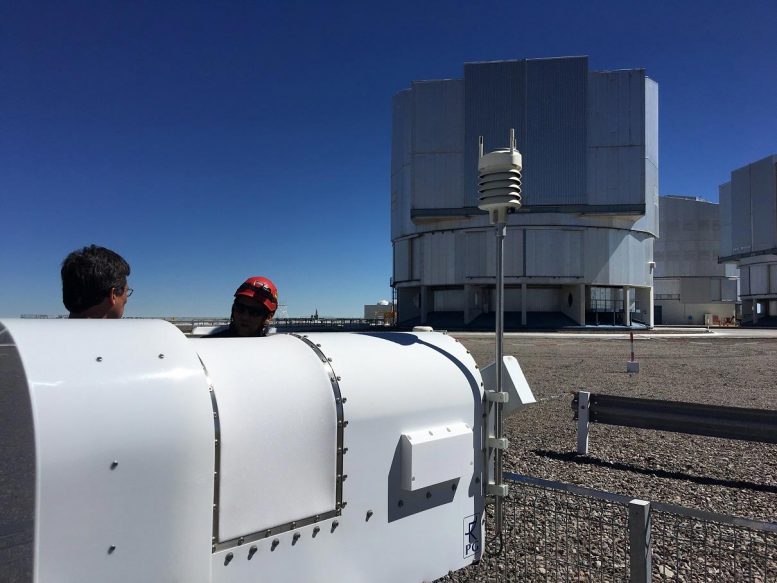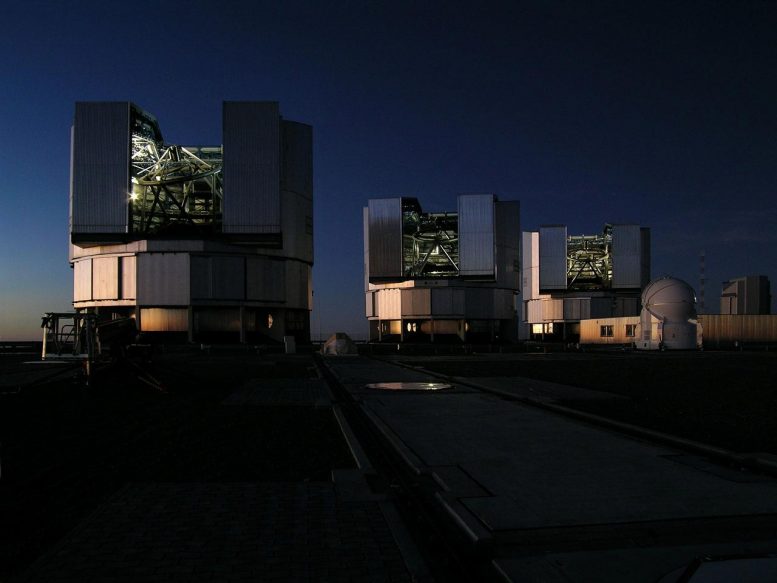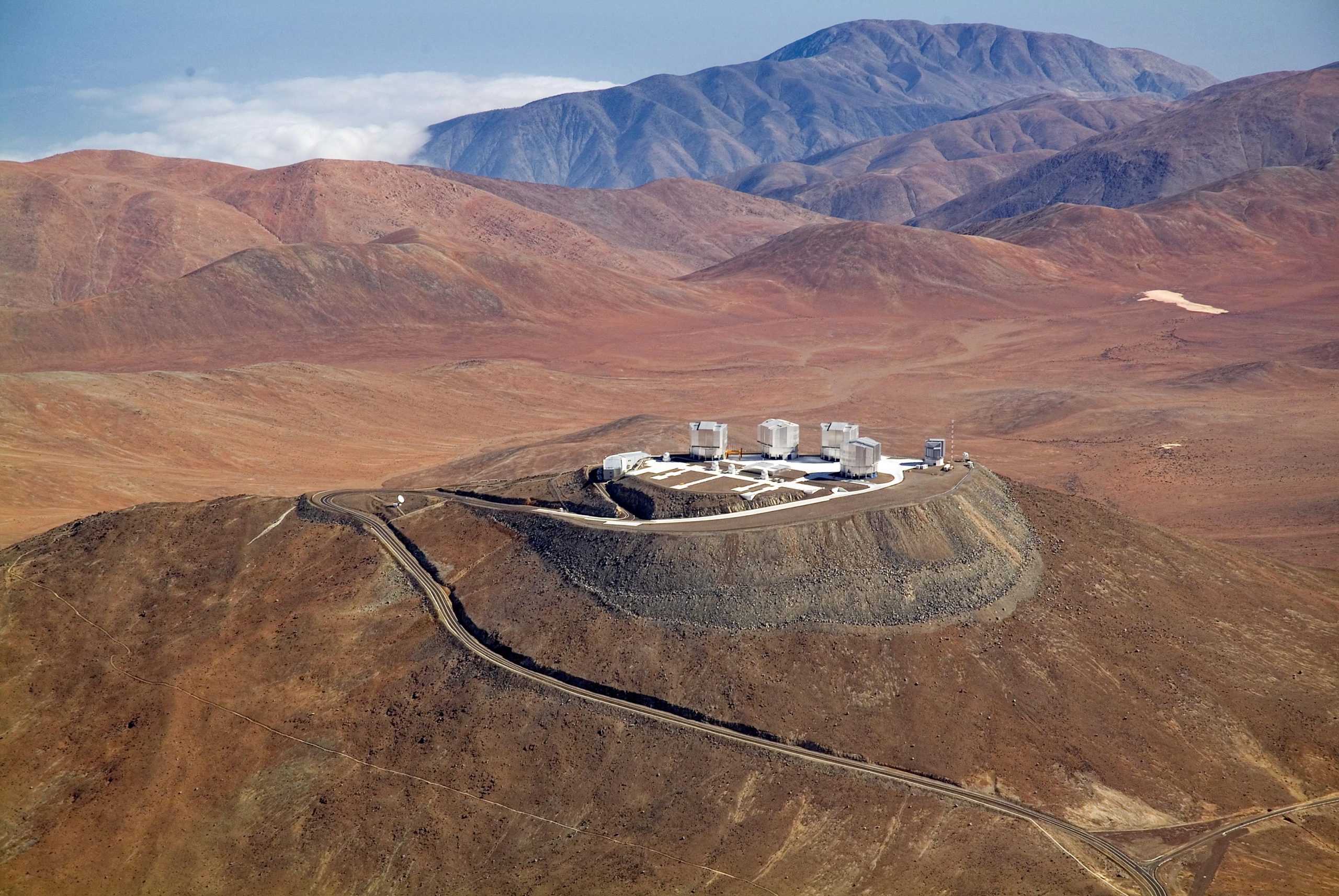Rising temperatures at the location of the observatory affect the image quality. Photo credit: JL Dauvergne & G. Hüdepohl (atacamaphoto.com) / ESO
Climatic changes associated with global warming can affect astronomical observations. That is the result of a study with scientists from the University of Cologne. The international research team examined a number of climate parameters at the Very large telescope (VLT) in Paranal in the Atacama Desert in Chile, where the European Southern Observatory (ESO) operates his telescopes. The team evaluated, among other things, the data for temperature, wind speed and wind direction as well as the water vapor content in the atmosphere over a period of several decades. This showed a rise in temperature above the world average and also an increasing image blurring due to air turbulence – so-called vision.
The study “The Effects of Climate Change on Astronomical Observations” was published in a current issue of Natural astronomy and can be viewed online. The results are not only important for astronomers to adapt their observations to changing environmental conditions, but must also be taken into account when planning new large telescopes – for example the extremely large telescope (ELT) that is currently being built near the Paranal.

Meteorologists emphasize that climate change must be taken into account when building new telescopes. Photo credit: Susanne Crewell, University of Cologne
The Cologne-based scientist Professor Dr. Susanne Crewell and Christoph Böhm from the Institute for Geophysics and Meteorology were involved in the study. In the past, they had already examined various aspects of the past, present and future climate at the location of the telescope at the location of the telescope as part of the Collaborative Research Center 1211 “Earth – Evolution on the Dry Border”. The first author of the article is Faustine Cantalloube from the Max Planck Institute for Astronomy in Heidelberg.
The researchers investigated the extent to which climate change affects astronomy and, in particular, the quality of the observations. The team focused on the Paranal Observatory in northern Chile because it has a number of environmental sensors that document local weather conditions. These measurements produced one of the most comprehensive data sets of the last three decades in a largely untouched location.

Three of the four telescope units of the VLT at night. Photo credit: ESO / G.Hüdepohl (atacamaphoto.com)
Based on this data set, astronomers, climate researchers, atmospheric researchers and meteorologists have teamed up to identify important meteorological parameters that play a role in the quality of astronomical observations. The data enabled them to analyze long-term trends over a period of more than 30 years to determine the effects of climate change on future observations. Using four examples, they showed how climate change is already affecting the operation of an astronomical observatory or how it could affect it in the future. The VLT operated by ESO served as an example.
‘The data showed a 1.5 ° C increase in surface temperature over the past four decades at the Paranal Observatory. This is slightly more than the global average of 1 ° C since the pre-industrial era, ”said Susanne Crewell. Since the original telescope cooling system was not designed for such warm conditions, the quality of the observations is increasingly endangered by more frequent turbulence – a consequence of the rise in temperature. The expected increase of 4 ° C (the most pessimistic scenario of the ICCP climate simulations) within the next century must therefore be taken into account when building the 39-meter extremely large telescope (ELT) at a nearby location.
In particular, astronomers are faced with the challenge of reducing what is known as “dome vision”, a reduction in resolution due to turbulence within the telescope dome. The researchers also noticed an increase in turbulence in the air layer near the ground, which blurred images as cold and warm air layers with different refractive indices alternate more quickly. However, it is difficult to attribute this to climate change as there have also been structural changes. The increase in wind shear in the upper troposphere in connection with the jet stream also leads to a so-called “wind-driven atrium”. This phenomenon occurs when atmospheric turbulence conditions change faster than the telescope’s control system can correct. This limits the contrast capabilities of the instrument and can possibly limit Exoplanet Studies. An increase in water vapor in the atmosphere could also reduce the astronomical signal.
From their unique perspective on the universe, astronomers know that the origin of life on Earth was a complex process made possible only by the coincidence of extremely rare circumstances. There is no second earth in our neighborhood. For this reason the current edition of Natural astronomy, published on September 10, 2020, is dedicated to the topic of climate. The special edition is intended to raise awareness in astronomy of climate issues that are important for the work of astronomers.
Reference: “The Effects of Climate Change on Astronomical Observations” by Faustine Cantalloube, Julien Milli, Christoph Böhm, Susanne Crewell, Julio Navarrete, Kira Rehfeld, Marc Sarazin and Anna Sommani, September 10, 2020, Natural astronomy.
DOI: 10.1038 / s41550-020-1203-3



